Namespaces | |
| namespace | detail |
Classes | |
| struct | alloc_info |
| Tracks state allocations. More... | |
| class | defer_pop |
Pops n values from the Lua stack at scope exit. More... | |
| struct | error |
"Pushing" this value causes lua_error to be called. More... | |
| struct | function_value |
| Owning reference to a function on the stack. More... | |
| struct | function_view |
| Non-owning reference to a function on the stack. More... | |
| class | global_table |
| Table interface to the global environment. More... | |
| struct | nil_type |
Used to push nil values onto the stack. More... | |
| struct | stack_get |
| Reads a value from the Lua stack. More... | |
| struct | stack_get< bool > |
| Converts a value to boolean using Lua's rules (i.e. More... | |
| struct | stack_get< const char * > |
| Reads a C string value. More... | |
| struct | stack_get< const lua_vector< T > & > |
| struct | stack_get< lua_CFunction > |
Reads a lua_CFunction value. More... | |
| struct | stack_get< lua_vector< T > * > |
| struct | stack_get< pos > |
| struct | stack_get< state_view > |
| struct | stack_get< std::optional< T > > |
Reads a T if a value exists at that index (no type check is performed). More... | |
| struct | stack_get< std::string > |
| Reads a string value as ptr+size. More... | |
| struct | stack_get< std::string_view > |
| Reads a string value as ptr+size. More... | |
| struct | stack_get< std::tuple< Ts... > > |
| Reads a sequence of values from the stack. More... | |
| struct | stack_get< std::vector< T > > |
| Reads a table array as a vector. More... | |
| struct | stack_get< T & > |
| Reads a user type as a full user data value (reference overload). More... | |
| struct | stack_get< T * > |
Reads a light user data value as void*. More... | |
| struct | stack_get< T > |
Reads a value convertible to lua_Integer. More... | |
| struct | stack_push |
| Pushes a value onto the Lua stack. More... | |
| struct | stack_push< bool > |
| Pushes a value as a Lua boolean. More... | |
| struct | stack_push< const char * > |
| Pushes a C string value. More... | |
| struct | stack_push< error< T > > |
| Emits an error. More... | |
| struct | stack_push< lua_CFunction > |
Pushes a lua_CFunction value. More... | |
| struct | stack_push< lua_vector< T > > |
| struct | stack_push< nil_type > |
Pushes a Lua nil value. More... | |
| struct | stack_push< R(*)(Args...)> |
| Pushes a function pointer. More... | |
| struct | stack_push< R(T::*)(Args...) const > |
Same as the previous specialization, but for const member functions. More... | |
| struct | stack_push< R(T::*)(Args...)> |
| Same as the previous specialization, but for member functions. More... | |
| struct | stack_push< std::optional< T > > |
Pushes a T if the object contains a value, otherwise nothing. More... | |
| struct | stack_push< std::string > |
Convenience specialization for the std::string_view overload. More... | |
| struct | stack_push< std::string_view > |
| Pushes a ptr+size string value. More... | |
| struct | stack_push< std::tuple< Ts... > > |
| Pushes a sequence of values onto the stack. More... | |
| struct | stack_push< std::variant< Ts... > > |
| Pushes the active member of the variant. More... | |
| struct | stack_push< T & > |
| Pushes a user type as a full user data value (reference specialization). More... | |
| struct | stack_push< T * > |
| Pushes a generic pointer as a light user data value. More... | |
| struct | stack_push< T > |
Pushes a value convertible to lua_Integer. More... | |
| struct | stack_push< table_proxy< T, Ks... > > |
| struct | stack_push< void > |
| Generic version of stack_push, deduces type from the argument. More... | |
| struct | state |
Owning lua_State wrapper. More... | |
| class | state_view |
| class | static_register |
| Registers a function to be executed when the Lua state is initialized. More... | |
| struct | table |
| Owning reference to a table on the stack, popped when destroyed. More... | |
| class | table_proxy |
| Expression template for table assignemnts. More... | |
| struct | table_view |
| Non-owning reference to a table on the stack. More... | |
| class | traceback |
| Type used to output the Lua call stack. More... | |
| class | user_data |
| Data block allocated for user data objects. More... | |
| struct | user_data< T > |
| struct | user_data_header |
| Header placed before a user data allocation. More... | |
| struct | value |
| Owning stack value reference. More... | |
| class | value_view |
| Base, non-owning generic stack value reference. More... | |
Concepts | |
| concept | user_type |
| concept | stack_ref |
Enumerations | |
| enum class | type : int { X , none = LUA_TNONE , nil = LUA_TNIL , boolean = LUA_TBOOLEAN , light_user_data = LUA_TLIGHTUSERDATA , number = LUA_TNUMBER , string = LUA_TSTRING , table = LUA_TTABLE , function = LUA_TFUNCTION , user_data = LUA_TUSERDATA , thread = LUA_TTHREAD } |
LUA_T* constants as a scoped enumeration. More... | |
Functions | |
| template<typename R , typename ... Args> | |
| R | call (lua_State *L, R(*f)(Args...), int i) |
Calls the regular function f with arguments taken from the stack. | |
| template<typename R , typename T , typename ... Args> | |
| R | call (lua_State *L, R(T::*f)(Args...), int i) |
Calls member function f with object/arguments taken from the stack. | |
| template<stateless_lambda T> | |
| call (lua_State *L, T, int i) | |
| Calls a stateless lambda. | |
| template<typename T > | |
| auto | ipairs (const T &table) |
Simple wrapper for a table value, returns ipairs-style iterators. | |
| int | msgh (lua_State *L) |
Default message handler for lua_pcall. | |
| void | print_stack (lua_State *L) |
| Logs the current data stack. | |
| void | print_traceback (lua_State *L) |
| Logs the current call stack. | |
| template<typename T > | |
| error (T) -> error< T > | |
| constexpr type | type_from_lua (int t) |
Maps LUA_T* values to type. | |
| std::string_view | type_str (type t) |
| template<member_pointer auto p> | |
| int | accessor (lua_State *L) |
| Lua function template which pushes an object's member. | |
| template<member_pointer auto p> | |
| int | value_accessor (lua_State *L) |
| Similar to nngn::lua::accessor, but returns the member by value. | |
| template<typename T > | |
| T | get (nngn::lua::state_view L, int i) |
| template<typename T = value_view> | |
| T | push (nngn::lua::state_view lua, auto &&v) |
| template<typename T , typename PT , typename ... Ks> | |
| operator== (T &&lhs, const table_proxy< PT, Ks... > &rhs) | |
| template<typename T , typename PT , typename ... Ks> | |
| operator== (const table_proxy< PT, Ks... > &lhs, T &&rhs) | |
| table | table_array (state_view lua, auto &&...args) |
| Creates a table array with each argument in succession. | |
| template<std::ranges::range T> | |
| table | table_from_range (state_view lua, T &&r) |
| Creates a table array from a range. | |
| table | table_map (state_view lua, auto &&...args) |
| Creates a table with each successive argument pair as key/value. | |
| std::ostream & | operator<< (std::ostream &os, const traceback &t) |
| auto | defer_settop (lua_State *L, int i=-1) |
| Resets the top of the stack at scope exit. | |
| auto | stack_mark (lua_State *L, int extra=0) |
| Creates a scoped object which verifies the stack top at scope exit. | |
| template<typename T > | |
| bool | operator== (T &&lhs, const value_view &rhs) |
| template<typename T > | |
| bool | operator== (const value_view &lhs, T &&rhs) |
Variables | |
| constexpr struct nngn::lua::nil_type | nil |
| constexpr std::array | types |
| type values as a sequential array. | |
| template<typename T > | |
| constexpr auto | is_user_type = false |
| Flag which indicates that a type is to be treated as a user type. | |
| template<typename T > | |
| constexpr empty | metatable_name = {} |
Key in the global table where the meta-table for T is stored. | |
| template<typename T > | |
| constexpr bool | is_stack_ref = false |
| Determines whether a type is a reference to a value on the stack. | |
| template<typename T > | |
| constexpr bool | is_stack_ref< T > = true |
| template<typename T > | |
| constexpr auto | user_data_header_align |
Enumeration Type Documentation
◆ type
|
strong |
Function Documentation
◆ accessor()
| int nngn::lua::accessor | ( | lua_State * | L | ) |
Lua function template which pushes an object's member.
Receives a user data value of the containing type and returns a pointer to the member.

◆ call() [1/3]
| R nngn::lua::call | ( | lua_State * | L, |
| R(* | f )(Args...), | ||
| int | i ) |
Calls the regular function f with arguments taken from the stack.

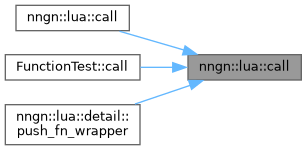
◆ call() [2/3]
| R nngn::lua::call | ( | lua_State * | L, |
| R(T::* | f )(Args...), | ||
| int | i ) |
Calls member function f with object/arguments taken from the stack.
Calls member function, const overload.

◆ call() [3/3]
Calls a stateless lambda.

◆ defer_settop()
|
inline |
Resets the top of the stack at scope exit.


◆ error()
◆ get()
| T nngn::lua::get | ( | nngn::lua::state_view | L, |
| int | i ) |
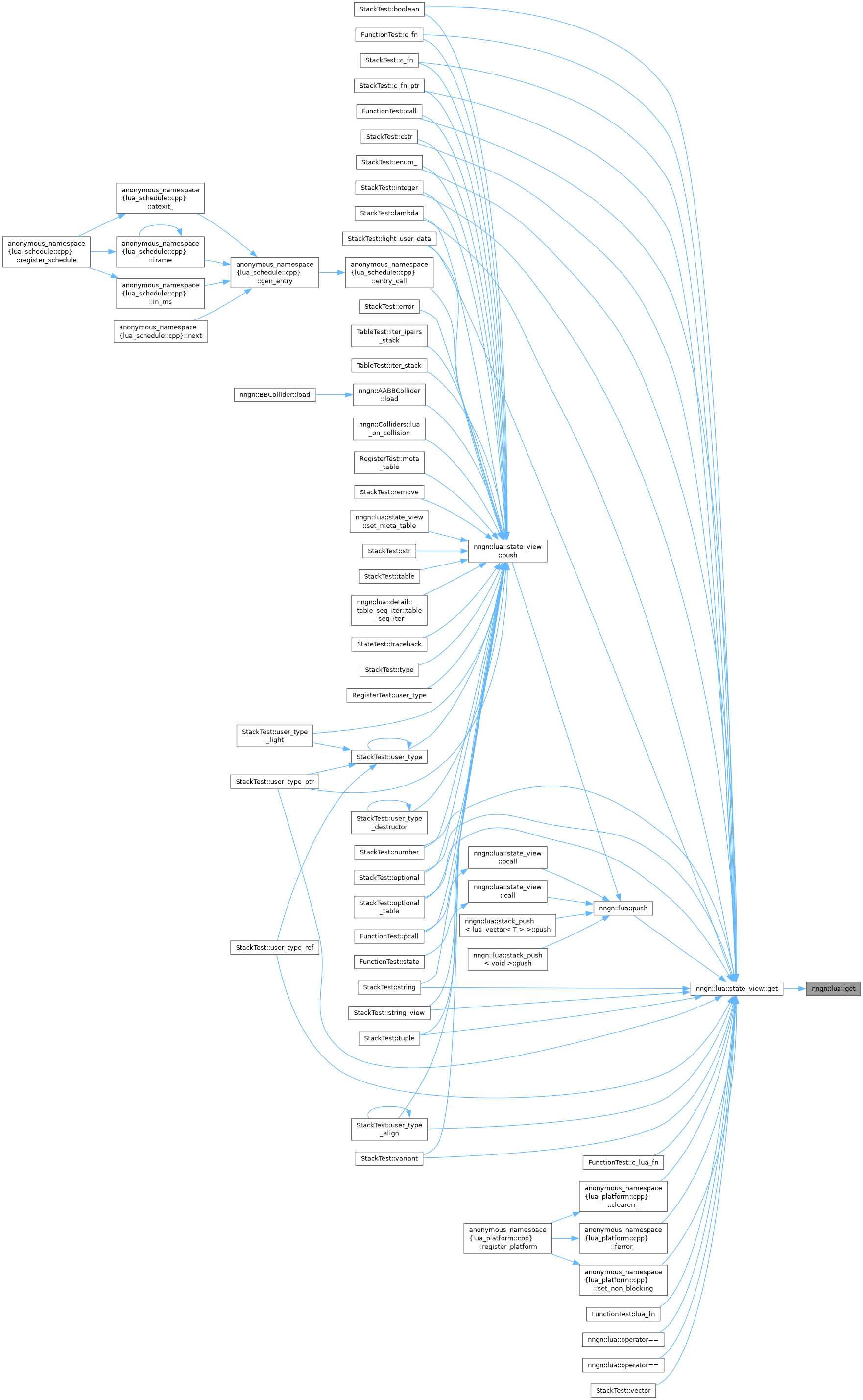
◆ ipairs()
Simple wrapper for a table value, returns ipairs-style iterators.
Intended to be used directly in a range for expressions to modify the implicit begin/end calls, e.g.:
Since it is a function, most uses can omit the namespace qualification and use the name directly due to ADL.

◆ msgh()
| int nngn::lua::msgh | ( | lua_State * | L | ) |
Default message handler for lua_pcall.

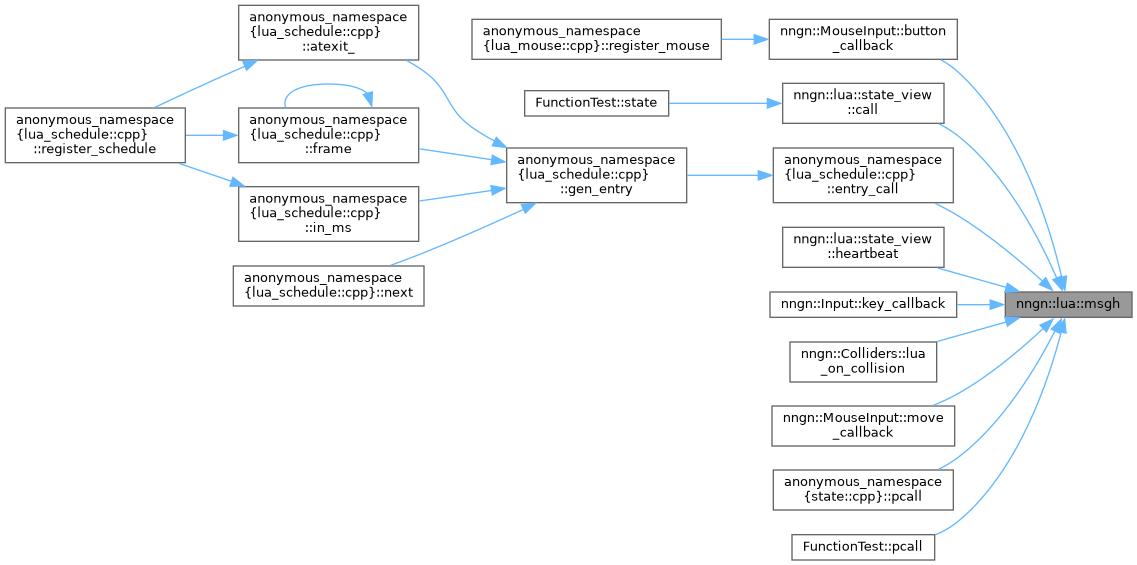
◆ operator<<()
◆ operator==() [1/4]
| nngn::lua::operator== | ( | const table_proxy< PT, Ks... > & | lhs, |
| T && | rhs ) |
◆ operator==() [2/4]
| bool nngn::lua::operator== | ( | const value_view & | lhs, |
| T && | rhs ) |
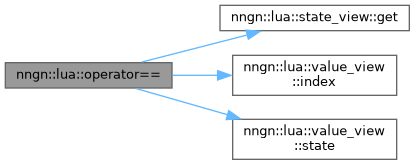
◆ operator==() [3/4]
| nngn::lua::operator== | ( | T && | lhs, |
| const table_proxy< PT, Ks... > & | rhs ) |
◆ operator==() [4/4]
| bool nngn::lua::operator== | ( | T && | lhs, |
| const value_view & | rhs ) |
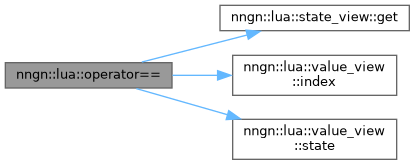
◆ print_stack()
| void nngn::lua::print_stack | ( | lua_State * | L | ) |
Logs the current data stack.
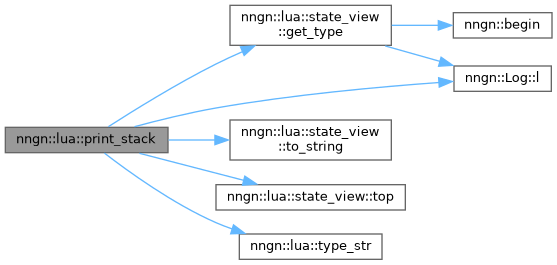

◆ print_traceback()
| void nngn::lua::print_traceback | ( | lua_State * | L | ) |
Logs the current call stack.


◆ push()
| T nngn::lua::push | ( | nngn::lua::state_view | lua, |
| auto && | v ) |

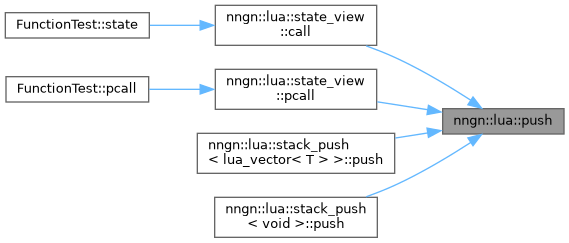
◆ stack_mark()
|
inline |
Creates a scoped object which verifies the stack top at scope exit.
At the end of the object's scope, a message is logged if the current top of the stack is different than orig + extra, where orig is the top at the time of the stack_mark call.
- See also
- nngn::scoped

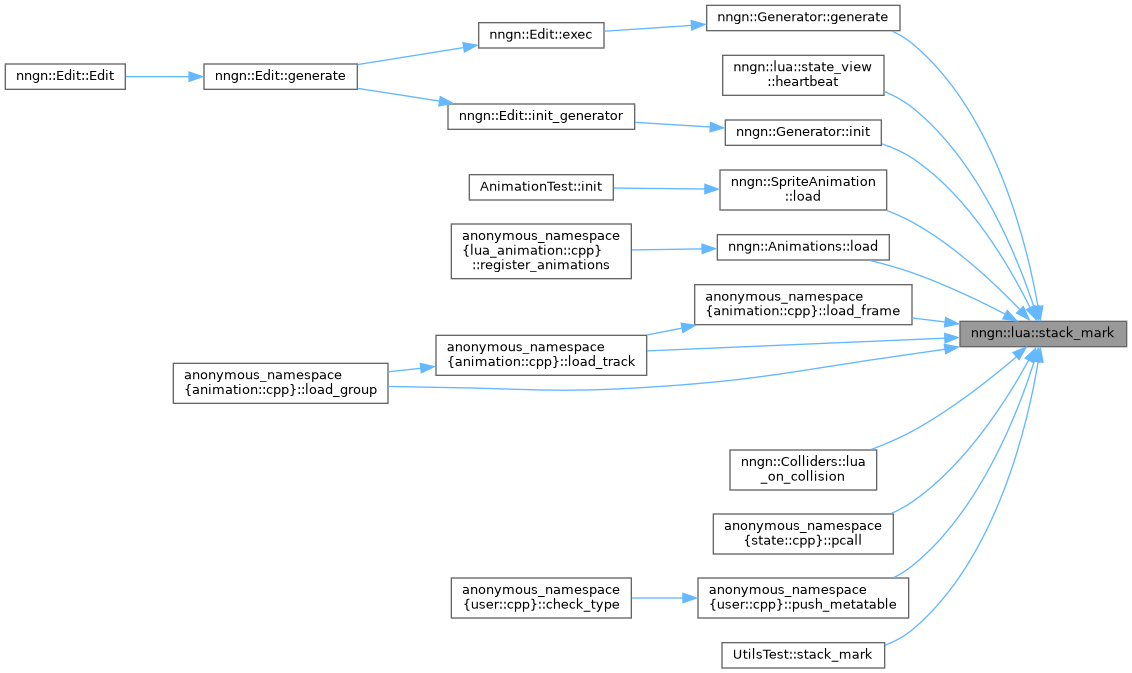
◆ table_array()
| table nngn::lua::table_array | ( | state_view | lua, |
| auto &&... | args ) |
Creates a table array with each argument in succession.

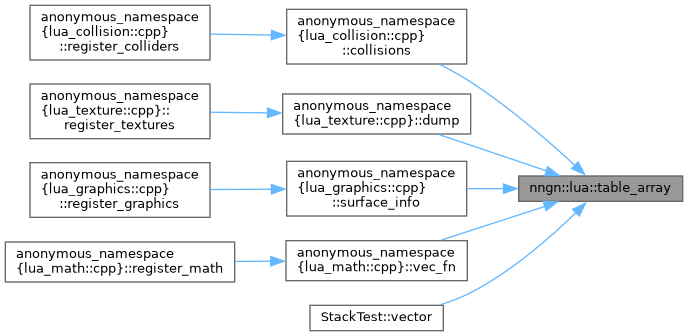
◆ table_from_range()
| table nngn::lua::table_from_range | ( | state_view | lua, |
| T && | r ) |
Creates a table array from a range.

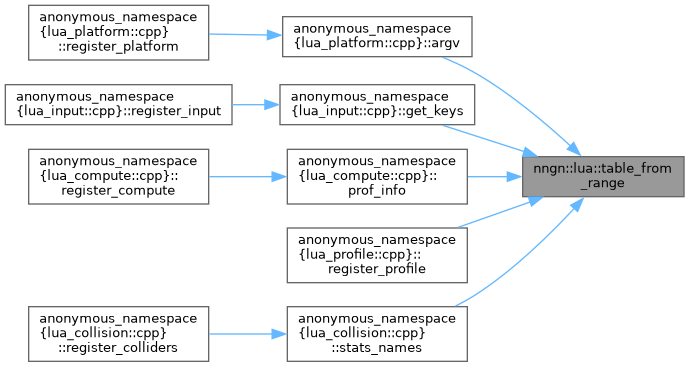
◆ table_map()
| table nngn::lua::table_map | ( | state_view | lua, |
| auto &&... | args ) |
Creates a table with each successive argument pair as key/value.
I.e {[args[0]] = args[1], [args[2]] = args[3], ...}.

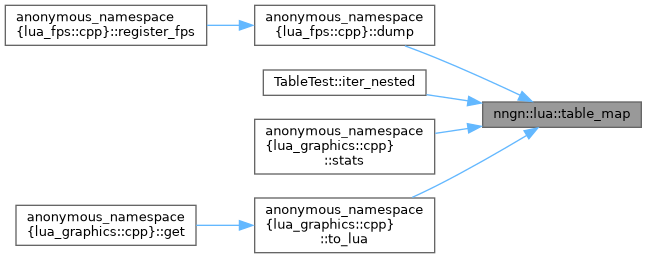
◆ type_from_lua()
Maps LUA_T* values to type.


◆ type_str()
|
inline |

◆ value_accessor()
| int nngn::lua::value_accessor | ( | lua_State * | L | ) |
Similar to nngn::lua::accessor, but returns the member by value.
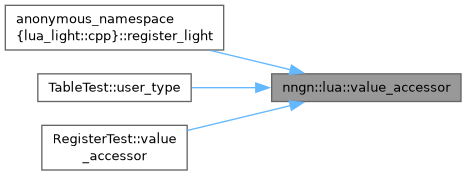
Variable Documentation
◆ is_stack_ref
Determines whether a type is a reference to a value on the stack.
These will be left on the stack after they are retrieved from a table. Specializations can be added for user-provided types.
◆ is_stack_ref< T >
|
inlineconstexpr |
◆ is_user_type
|
inlineconstexpr |
Flag which indicates that a type is to be treated as a user type.
Specializations should be added (see NNGN_LUA_DECLARE_USER_TYPE) to indicate that values of this type should be read from / pushed onto the stack as Lua full user data values.
◆ metatable_name
Key in the global table where the meta-table for T is stored.
Actual type is fixed_string, empty is used to make the unspecialized value invalid.
- See also
- NNGN_LUA_DECLARE_USER_TYPE
◆ nil
| struct nngn::lua::nil_type nngn::lua::nil |
◆ types
|
inlineconstexpr |